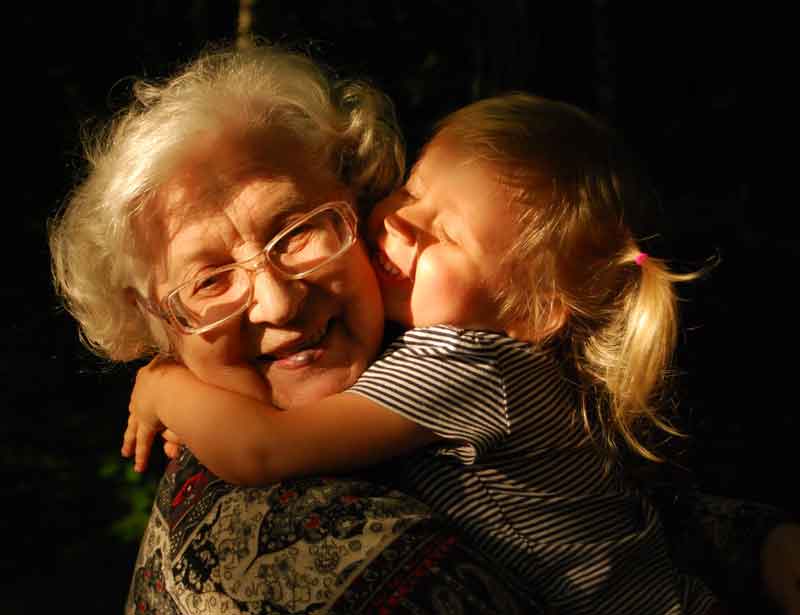
The appellation didn't last long, but the ambiguity of a grandmother's position remained strongly imprinted in my teenage mind.
Both mothering and grandmothering are nurturing and encouraging functions. Both are predicated on unconditional love with responsibilities. Both are about giving time, attention, endorsement, and assistance wisely.
Yet there are differences. It's the parents who have the responsibility of raising children: to inculcate values and develop character. Modeling behavior and mindful guidance with principles is primarily their job, not that of the older generation.
Today, parents go to parenting classes to learn to do their job better, because there's a feeling that instinct and good intentions aren't good enough anymore.
Communication between parents and children is so fraught with perils as well as possibilities that the young parents want help in defusing conflict, infusing confidence, and refusing to react emotionally.
How much do we protect without stifling children with no's? How do we train them to make good choices without exposing them to the harmful influences of modern ease of communication, and the concomitant access to seriously dangerous practices?
The wise words of veteran parenting expert mothers and educators are now accessible by teleconference or zoom right at home; a parent doesn't even have to leave the children with babysitters to acquire the tips and tricks of the trade.
The pressures on us, the Jewish generation past the child-raising/stay-at-home stage, are also intensifying as we grow older.
Our own parents are living longer, we have jobs, and our children need more from us in order to manage. We may still be paying for weddings and degrees kollel, still going to PTA and performances, but we want a close relationship with the grandkids too, no matter our financial and time constraints.
How to allocate our limited resources is a decision we are constantly revisiting, as circumstances change every few months.
I know of no grandparenting classes available, but my grandmother-peers are pondering our own changing role. Giving chocolate, bestowing kisses, and praising good behavior like our grandparents did are not enough anymore.
We don't want to just ooh and aah about their artwork, academic achievements, sports accomplishments, and performances. W – we want to be part of the process.
We want to spend time with our grandchildren, to create memories of sharing, positive experiences, and real conversation.
I know grandfathers who travel a half hour each way once a week to learn Torah with their grandchildren, and a grandmother who comes to play baseball with her grands regularly. We want to be a vital presence in their lives, more than just a source of occasional treats.
We're fortunate that the core Jewish culture is similar to what we grew up with. Many of us have grandchildren attending the same schools and camps that we did. The generation gap seems smaller than it once was.
At the same time, active participation runs the risk of over-involvement. When we spend significant amounts of time together, it's easy to fall into the trap of assuming parental roles. But disciplining is not our job – guiding and setting limits for grandchildren during the time we spend together is. Setting boundaries for ourselves is important too.
Today's cool grandmothers need to be Bubbies with Borders.
We should support the paths that our children have chosen in which to raise their children. But we are not the primary people who bring them up, just as we are not the primary care-givers. Babysitting, helping with holiday preparations, easing financial pressures, and being supportive in the educational realm are positive values, but not obligations.
Many of the older generation feel that our own children don't get the education part of parenting right. We may feel the grandkids are getting too much electronic entertainment, even if it is wholesome and positive.
Or that the parents are not giving the kids enough time and attention at home.
Perhaps the grandkids don't have enough responsibility, and are being spoiled. On the other hand, parents may feel the grandparents are too indulgent in the gift and food departments. They don't want us to give the kids junk food and junk entertainment.
Parenting is the province of parents. The business of Bubbies is indirect, a supporting and reinforcing role. Bubby-ing classes may not yet be available, but we can learn the lessons of the past.
Closeness and care with boundaries is the road to take.
(COMMENT, BELOW)
A former nonprofit management professional and now freelance writer, digital marketing strategist and political advocate, Faigie Horowitz has cofounded a shelter for homeless girls, a synagogue on Long Island, and mostly recently JWOW!, Jewish Women of Wisdom, a community for midlifers. She holds a Masters in Management and nests on Long Island with way too many closets.
Previously:
• I'm an addict, but NOT in treatment
• My Book of Life will not be an artifact


 Contact The Editor
Contact The Editor
 Articles By This Author
Articles By This Author